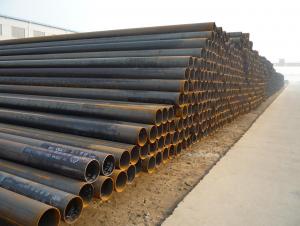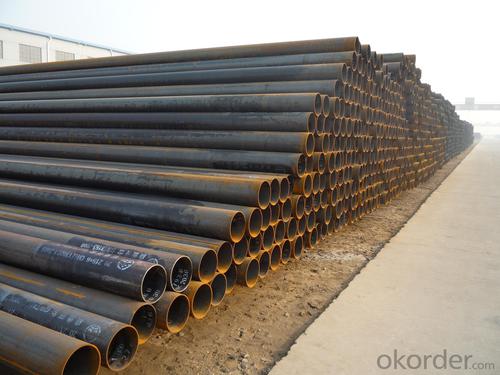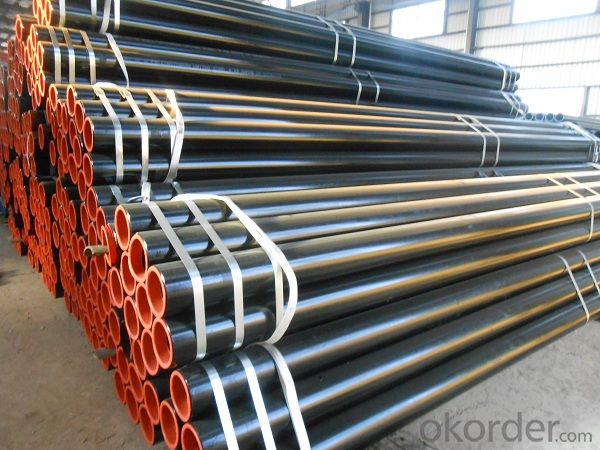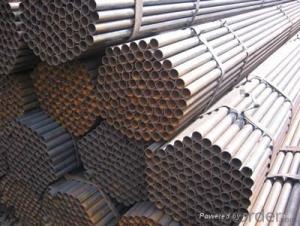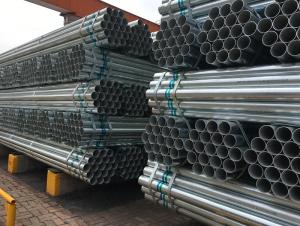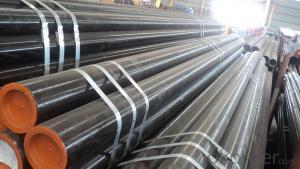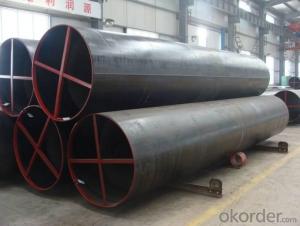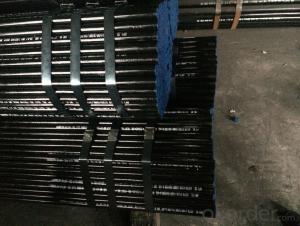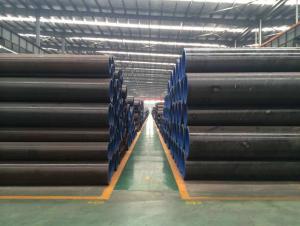Welded Black ERW Steel Pipe 5L elded Black ERW Steel Pipe 5L
- Loading Port:
- China Main Port
- Payment Terms:
- TT or LC
- Min Order Qty:
- 30 m.t.
- Supply Capability:
- 7500 m.t./month
OKorder Service Pledge
OKorder Financial Service
You Might Also Like
1、Structure of Welded Steel Pipe API SPEC 5CT:
Welded Steel Pipe is to be used for conveying gas, water, and petroleum foroil and natural gas industries. And used for structural steel pies purpose. As the manufacturing process does not include any welding, seamless pipes are perceived to be stronger and more reliable. Historically seamless pipe was regarded as withstanding pressure better than other types, and was often more easily available than welded pipe.
2、Main Features of Welded Steel Pipe API SPEC 5CT:
• High manufacturing accuracy
• High strength
• Small inertia resistance
• Strong heat dissipation ability
• Good visual effect
• Reasonable price
3、Welded Steel Pipe API SPEC 5CT: Specification:
Standard | GB, DIN, ASTM ASTM A106-2006, ASTM A53-2007 |
Grade | 10#-45#, 16Mn 10#, 20#, 45#, 16Mn |
Thickness | 8 - 33 mm |
Section Shape | Round |
Outer Diameter | 133 - 219 mm |
Place of Origin | Shandong, China (Mainland) |
Secondary Or Not | Non-secondary |
Application | Hydraulic Pipe |
Technique | Cold Drawn |
Certification | API |
Surface Treatment | factory state or painted black |
Special Pipe | API Pipe |
Alloy Or Not | Non-alloy |
Length | 5-12M |
Outer Diameter | 21.3-610mm |
Grade | 20#, 45#, Q345, API J55, API K55, API L80, API N80, API P110, A53B |
Standard | ASME, ASTM |
4、Packaging & Delivery
Packaging Details: | seaworthy package,bundles wrapped with strong steel strip |
Delivery Detail: | 15-30days after received 30%TT |
5、FAQ of Welded Steel Pipe API SPEC 5CT:
①How is the quality of your products?
Our products are manufactured strictly according to national and internaional standard, and we take a test
on every pipe before delivered out. If you want see our quality certifications and all kinds of testing report, please just ask us for it.
Guaranteed: If products’ quality don’t accord to discription as we give or the promise before you place order, we promise 100% refund.
②How about price?
Yes, we are factory and be able to give you lowest price below market one, and we have a policy that “ for saving time and absolutely honest business attitude, we quote as lowest as possible for any customer, and discount can be given according to quantity”,if you like bargain and factory price is not low enough as you think, just don’t waste your time.Please trust the quotation we would give you, it is professional one.
③Why should you chose us?
Chose happens because of quality, then price, We can give you both.Additionally, we can also offer professional products inquiry, products knowledge train(for agents), smooth goods delivery, exellent customer solution proposals.Our service formula: good quality+good price+good service=customer’s trust
SGS test is available, customer inspection before shipping is welcome, third party inspection is no problem.
6、 Welded Steel Pipe API SPEC 5CT: Images:
- Q: Can steel pipes be used for underground sewer systems?
- Yes, steel pipes can be used for underground sewer systems. Steel pipes are strong, durable, and resistant to corrosion, making them suitable for underground applications. However, factors such as the type of soil, water composition, and potential for ground movement should be considered to ensure proper installation and longevity of the sewer system.
- Q: Can steel pipes be used for transporting liquids?
- Yes, steel pipes can be used for transporting liquids. Steel pipes are commonly used in various industries, including oil and gas, water supply, and sewage systems, due to their durability, strength, and resistance to corrosion. They are effective for transporting liquids such as water, oil, natural gas, and chemicals over long distances efficiently and safely.
- Q: Can steel pipes be used for underground gas distribution?
- Yes, steel pipes can be used for underground gas distribution. Steel pipes are commonly used for gas distribution as they are strong, durable, and can withstand high pressure. Additionally, steel pipes have excellent resistance to corrosion, which is crucial for underground installations. However, it is important to ensure proper coating and insulation to prevent any potential damage or leakage.
- Q: Can steel pipes be used for signposts or street lighting poles?
- Yes, steel pipes can be used for signposts or street lighting poles. Steel pipes are often chosen for their durability, strength, and resistance to harsh weather conditions, making them suitable for supporting signs or street lighting fixtures.
- Q: What is the difference between standard wall thickness and extra-strong wall thickness steel pipes?
- The main difference between standard wall thickness and extra-strong wall thickness steel pipes lies in their thickness and durability. Standard wall thickness pipes have thinner walls and are suitable for most general applications, while extra-strong wall thickness pipes have thicker walls and are designed for heavy-duty or high-pressure applications. These extra-strong pipes offer enhanced strength and resistance, making them more reliable and suitable for handling extreme conditions or demanding projects.
- Q: How are steel pipes classified based on their end connections?
- Steel pipes can be classified based on their end connections into three main categories: threaded, flanged, and welded. Threaded pipes have screw threads on the ends, allowing for easy assembly and disassembly. Flanged pipes have flanges on the ends, which are flat surfaces that can be bolted together, providing a strong connection. Welded pipes have their ends welded together, creating a permanent and secure joint.
- Q: How do you calculate the deflection of a steel pipe?
- To calculate the deflection of a steel pipe, you need to consider various factors such as the material properties, applied loads, and geometrical characteristics. The following steps can guide you through the process: 1. Determine the material properties: Obtain the necessary information about the steel pipe, such as its Young's modulus (E), which represents its stiffness or resistance to deformation. This value is typically provided by the manufacturer or can be found in material databases. 2. Analyze the applied loads: Identify the types and magnitudes of the loads acting on the steel pipe. These loads can include point loads, distributed loads, or a combination of both. Determine the location and orientation of the applied loads as well. 3. Evaluate the pipe's geometry: Measure or obtain the dimensions of the steel pipe, including its length (L), outer diameter (D), and wall thickness (t). Ensure that these values are accurate to achieve a precise calculation. 4. Select an appropriate calculation method: Depending on the complexity of the loading and support conditions, you may need to use either simple beam theory or more advanced structural analysis methods, such as the finite element method (FEM). 5. Apply the appropriate equations: For simple beam theory, you can use the Euler-Bernoulli beam equation to calculate the deflection at a specific point on the pipe. This equation is based on assumptions that the pipe is homogeneous, linearly elastic, and subjected to small deflections. For more complex scenarios, FEM software can handle the calculations. 6. Determine the boundary conditions: Identify the support conditions at both ends of the pipe, which can include fixed supports, simply supported ends, or combinations of both. These conditions significantly affect the pipe's deflection. 7. Calculate the deflection: Using the equations relevant to your chosen method and incorporating the material properties, applied loads, and geometry, you can calculate the deflection at specific points along the steel pipe. The deflection can be measured in terms of vertical displacement or angular rotation. It is important to note that calculating the deflection of a steel pipe may require specialized engineering knowledge and software tools. If you lack experience in structural analysis, it is advisable to consult a professional engineer to ensure accurate results and safe design.
- Q: Are steel pipes suitable for underground installations in areas with high moisture content?
- Yes, steel pipes are suitable for underground installations in areas with high moisture content. Steel pipes are known for their durability and resistance to corrosion, which makes them ideal for withstanding moisture and underground conditions. Additionally, steel pipes can be coated or lined with protective materials to further enhance their resistance to moisture, ensuring their long-term performance and reliability in such environments.
- Q: How are steel pipes coated to prevent internal corrosion?
- Steel pipes are coated to prevent internal corrosion through a process called internal coating. This involves applying a layer of protective material, such as epoxy or polyethylene, to the inner surface of the pipe. The coating acts as a barrier, preventing the steel from coming into contact with corrosive substances in the fluid being transported, thus effectively reducing the risk of internal corrosion.
- Q: 20# seamless steel pipe and seamless steel pipe 20G what is the difference?
- The difference is: 20# ordinary steel seamless steel pipe. 20G is the type of steel for high pressure boiler tubes.
Send your message to us
Welded Black ERW Steel Pipe 5L elded Black ERW Steel Pipe 5L
- Loading Port:
- China Main Port
- Payment Terms:
- TT or LC
- Min Order Qty:
- 30 m.t.
- Supply Capability:
- 7500 m.t./month
OKorder Service Pledge
OKorder Financial Service
Similar products
Hot products
Hot Searches
Related keywords
